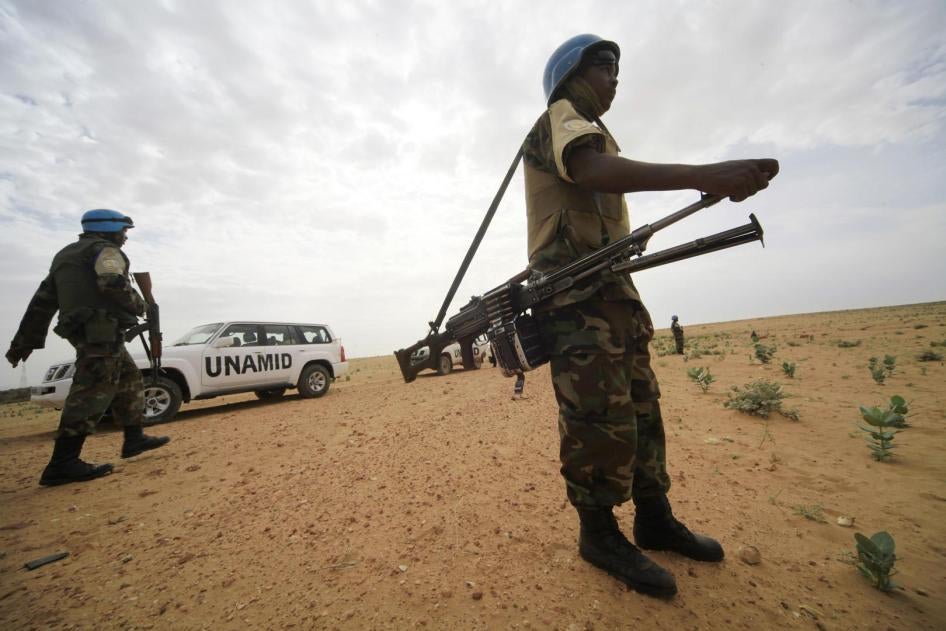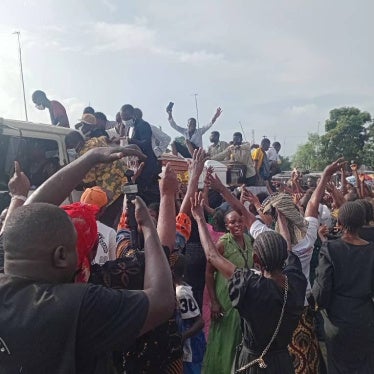Based on credible reports, Rapid Support Forces now occupy 9 of 10 sites vacated by the peacekeepers within the past eight months, and the transitional authorities have demanded that the mission should hand over the rest of its sites to the forces.
“The Security Council should not allow these abusive paramilitary forces to take over the Darfur mission’s bases,” said Jehanne Henry, associate Africa director at Human Rights Watch. “It should halt all handovers, re-assess downsizing plans, and refocus its attention on UNAMID’s core mandate to protect civilians.”
Instead of giving a green light to a continued drawdown of UNAMID, the Security Council should focus on preserving the mission’s capabilities to protect civilians and monitor human rights abuses. Human Rights Watch urged the Security Council to renew the mission with its current capabilities intact for the next 12 months, after which it will have ample opportunities to re-open discussions about a gradual withdrawal to ensure that civilians are protected, and their human rights respected.
The Rapid Support Forces have a long track record of abuse. They carried out highly abusive counter-insurgency campaigns in Darfur, and the Southern Kordofan and Blue Nile regions over the past five years, in which they attacked villages, killed and raped civilians, and burned and looted homes.
The RSF commander, Mohamed Hamdan Dagalo, or “Hemeti,” is now the deputy head of the transitional military council that assumed control of Sudan’s government following the ouster of former President Omar al-Bashir on April 11. Under his watch, the same forces have violently attacked protesters. On June 3, they raided the Khartoum sit-in site, burned down tents, and shot and beat protesters, killing more than 100 and injuring hundreds more.
In response to that attack and the political deadlock in Sudan, the African Union suspended Sudan’s membership until a civilian-led authority to govern the country is established.
In May, the transitional military council issued a decree demanding the Darfur mission hand all its assets directly to the RSF. Any such handovers would embolden the forces, possibly facilitate further violence against civilians, and would also most likely violate the UN’s own human rights due diligence policy, which requires a comprehensive risk assessment for handovers to security forces.
The situation in Darfur has clearly been affected by national dynamics, with authorities cracking down violently on protesters and killing at least 15 since April. In addition, throughout the year, attacks on civilians, including by the RSF, continued, especially in Jebal Mara region of Darfur, forcing civilians to flee.
The peacekeepers’ exit plans have been in process for several years. They were a response to demands from the former al-Bashir government that the mission pull out of Darfur. In June 2018, the Security Council approved drastic cuts, reduced the area of operation to Jebel Mara, and made plans for a full withdrawal by June 2020.
Human Rights Watch has repeatedly warned that the downsizing reflected a false narrative about Darfur’s war ending and would severely undermine the peacekeepers’ ability to monitor human rights and protect civilians across a still-volatile region.
The Darfur conflict, which began in 2003, has been marked by large-scale government air and ground attacks on civilians, destruction and burning of civilian property, and mass displacement. The UN’s humanitarian coordination agency estimates that over 3 million people need humanitarian assistance in Darfur, including 1.6 million living in over 60 camps. Hundreds of thousands of Darfuris still live in refugee camps in Chad.
In 2005, the UN Security Council referred Darfur to the International Criminal Court in resolution 1593. Charges against al-Bashir and four other officials for crimes in Darfur including genocide, war crimes, and crimes against humanity are outstanding. Sudan has refused to cooperate in the investigation and no suspects are in ICC custody. Following al-Bashir’s ouster the transitional council announced that he was in their custody and would be tried for corruption and other criminal charges in Sudan.
The ICC prosecutor will make her 29th report to the UN Security Council on her office’s work in Darfur on June 19 as part of her twice-yearly briefings to the council. The changed circumstances in Sudan provide an important opening for the council to press Sudan to cooperate with the ICC as required under resolution 1593 by surrendering al-Bashir and the other fugitives to the court, Human Rights Watch said.
“Sudan’s political instability inevitably has an impact on Darfur, especially given the rise of Hemeti and the shocking news that mission assets are going to his forces, despite the RSF’s long track record of abuses,” Henry said. “The RSF needs to be investigated for its abuses, not given tasks it’s unfit for. It’s utterly irresponsible to even consider handing peacekeeping assets to the government.”










